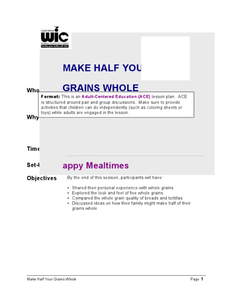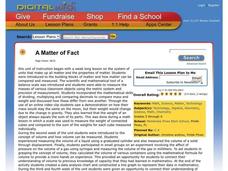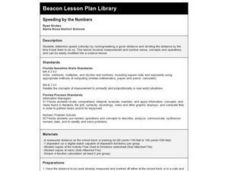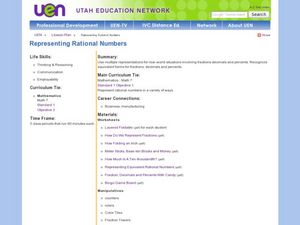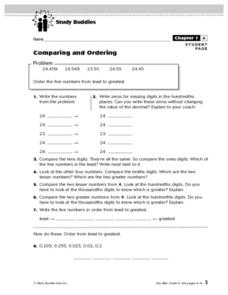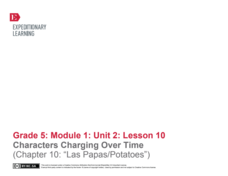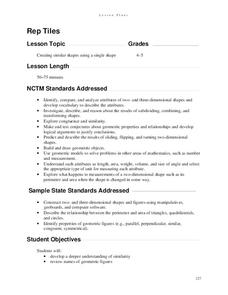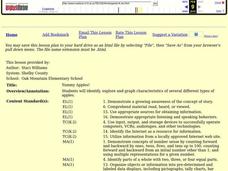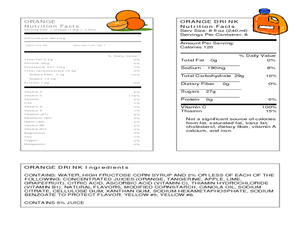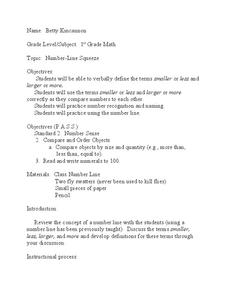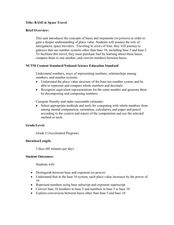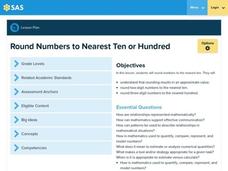Curated OER
Make Half Your Grains Whole
Students discuss the benefits of eating whole grains. In this adult health activity, students compare samples of whole grain food products. They recommend ways on how to incorporate whole grains in their family diet.
Curated OER
Going Whole Hog
Students participate in a game in which they compare fractions and graph the fractions.
Curated OER
Telling Time to 5 Minutes
Students take part in various activities ranging from creating a human clock, to small group problem solving to reinforce the concept of telling time accurately to five minutes on an analog clock.
Curated OER
A Matter of Fact
Students design their own Science experiment. In this science experiment lesson plan students create a hypothesis related to matter and test it. They displayed their data in a graph.
Curated OER
Who Needs Numbers?
Students identify whole numbers through the one millions place. In this place value lesson, students read the book The Day Without Math and use place value mats to create numbers to the millions place. Students use base ten blocks during...
Curated OER
Counting Zero to Five
Students are introduced to the numerals zero through five. They associate the numeral with the correct number of objects. Students comprehend the quantities zero through five showing "How many?" by counting their fingers or using a...
Curated OER
Speeding By The Numbers
Students determine speed by running or walking a given distance and dividing the distance by the time it took them to do so. They record their average speed and compare it with the speeds of other moving objects.
Curated OER
Representing Rational Numbers
Seventh graders explore rational numbers. In this fractions, decimals, and percents lesson, 7th graders identify and compare equivalencies between fractions, decimals, and percents. Students use hands-on activities to investigate the...
Curated OER
Comparing and Ordering (Decimal Numbers)
In this math worksheet, students learn to compare and order five numbers in a set. Numbers are decimals to the thousandths place. Students answer 8 questions. There are also activities which can be done with a partner.
Curated OER
Now One Foot, Now the Other
Second graders, working as a whole class, with partners or small groups, use various Web sites to investigate the relationship between generations.
EngageNY
Characters Changing Over Time (Chapter 10: "Las Papas/Potatos")
Engage further in Esperanza Rising with a focus on close reading and metaphor. Class members zero in on the tenth chapter, examining characters and big ideas. Pupils discuss the text in small groups and as a whole class, and...
EngageNY
The Pythagorean Theorem
Class members explore the estimation of irrational numbers in association with the Pythagorean Theorem. The first lesson of this module challenges pupils to use the Pythagorean Theorem to find unknown side lengths. When the length is not...
Improving Measurement and Geometry in Elementary Schools
Rep Tiles
In addition to the catchy title, this lesson plan provides upper graders an opportunity to more closely scrutinize the attributes of plane figures. In particular, they focus on the similarity of different shapes. Both whole-class and...
Curated OER
8th Grade Reading Comprehension Success
Augment your eighth grade language arts curriculum with a thorough set of reading comprehension activities and assessments. Focusing on a variety of skills, including vocabulary in context, text structure, main idea, and author's style,...
Missouri Department of Elementary
I’m Thumbody!
Positive and negative thinking is the focus of a lesson that boost self-awareness. Beginning with a whole-class discussion, scholars brainstorm what positive thinking looks and sounds like then compares and contrast the two types of...
Learner
Solid Shapes
A collection of two lessons, kindergartners will identify two-dimensional shapes in solid shapes. They will develop basic knowledge of the components that make up a sphere, rectangular prism, pyramid, cylinder, cone, and cube. Young...
Curated OER
Handling Data: measure of Average
Fifth graders analyze data from a simple table. In this graphing lesson plan, 5th graders compare distributions. Students recognize that the mean helps them find the formula. Students answer questions on the mean, median, and...
Curated OER
Yummy Apples!
Students discuss apples and how they are grown. They listen as the teacher reads "Apples," by Gail Gibbons. Students discuss the story. They view several different types of apples and compare their characteristics. Students taste several...
Curated OER
Healthy Food is Good Food!
Students examine the difference between whole foods and junk foods. In this food lesson, students learn the definitions of whole food and junk food. They find the difference in tastes and textures of different foods by performing taste...
Curated OER
Linear Inequalities
Young scholars solve linear inequalities. In this solving linear inequalities lesson, students solve one step inequalities algebraically. Young scholars graph the solutions on a number line. Students compare the graphs of various...
Curated OER
Number-Line Squeeze
First graders investigate numerals and size by ranking different numbers based upon value. In this number sense lesson, 1st graders practice using the terms smaller, larger, less and more in order to organize numbers on a number line....
Curated OER
Basic Counting Principle
Students find the number of possible arrangements of several objects by using the Basic Counting Principle. In this math lesson, students divide into groups and determine the number of possible sandwiches which can be made given certain...
Curated OER
BASE-ic Space Travel
In this 3-day place-value lesson, upper-elementary kids investigate the base 5 and base 2 systems as an introduction to exponents and powers. They create a pocket chart to help ground their understanding of bases, exponents, and powers,...
Pennsylvania Department of Education
Round Numbers to Nearest Ten or Hundred
Third graders review telling time. In this lesson on telling time, 3rd graders discuss various items that show length of time, including clocks, calendars and sand timers. Students review and practice what they already know about telling...


